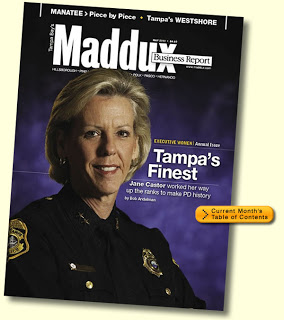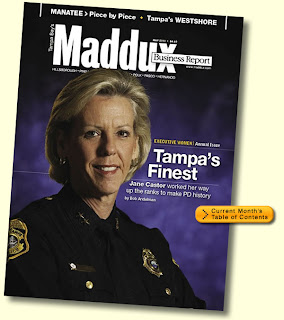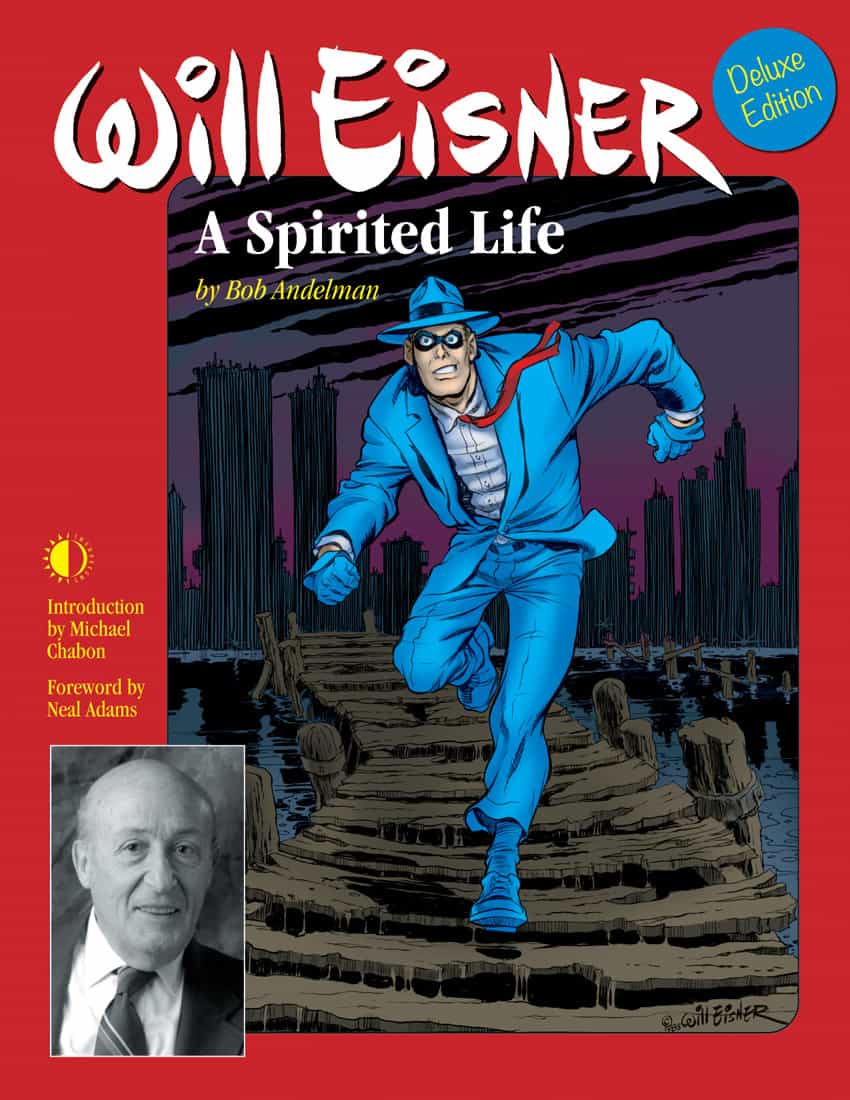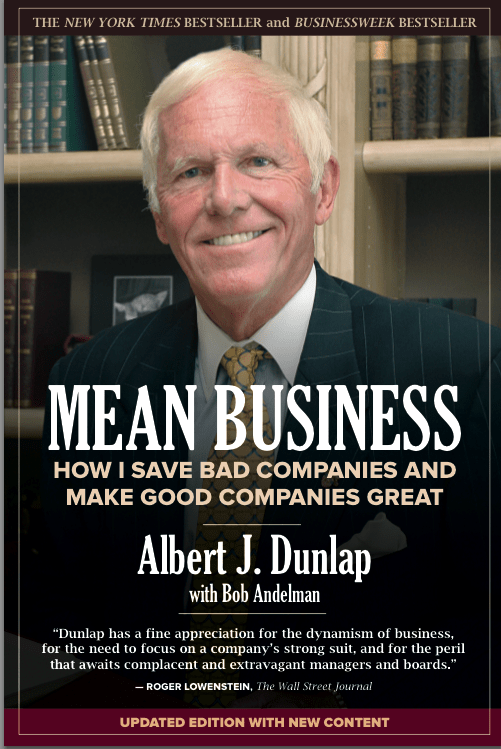By BOB ANDELMAN
Maddux Business Report
(Cover Story)
May 2010
Let’s say that Tampa Mayor Pam Iorio made a list of the things she wanted to accomplish before the end of her second term. Among them might be:
• Complete the new Tampa Museum of Art;
• Complete Riverwalk;
• Save as many essential services jobs—police, fire and emergency services—as possible from severe budget cuts.
Nowhere on the list—we asked her to double-check—was making local history by naming a woman as police chief.
And not just any woman, but an openly lesbian woman.
“I don’t think like that,” Iorio said. “That’s not how I make appointments.
“The era of ‘the first’ is long over with,” the mayor adds. “She’s not the first female police chief across the nation. We’ve come too far for that. Women are in top leadership positions all across our nation.”
As for the gay thing? Might as well re-read the answer above.
“That’s not a factor at all,” according to Iorio. “I think we’re way beyond that as well. It’s not relevant. In my hiring it’s irrelevant. From the time I hired her, other than the media, I haven’t received a call, a letter or a single comment from a single person in Tampa regarding the issue. I knew Jane was capable and had a lot of the traits I looked for. It was actually an easy decision to make.”
In a lot of places in the South, this decision would have been riven with controversy and outrage. It was only three years ago, for example, that the city manager of Largo shocked the community he served for 17 years by announcing that he wanted to be a she. A backlash caused him to be fired.
But there is something different about Jane Castor, 50, who Iorio named Tampa’s new police chief on September 16, 2009.
“Pretty impressive individual, isn’t she?” asks Castor’s predecessor, Steve Hogue.
Indeed. And Castor is someone who—based on a photo published in the St. Petersburg Times of her working out in a police gym—could kick the butt of anyone who doesn’t think so.
Jane Castor is a product of Tampa, through and through. She grew up in the city, the fourth of five children, lettering in basketball, swimming, volleyball and track at Chamberlain High and attending the University of Tampa on an athletic scholarship, At UT, she became a figure of legend, a 1,000-point shooter on the women’s basketball team.
She credits growing up around so many boys—brothers, friends and classmates—with putting her on the path to a rewarding career in athletics that, in turn, opened the door to developing her leadership skills in the PD.
“I was involved in athletics my entire life,” she says. “Working out—that’s my stress relief. I tell everybody, the more I look like Arnold Schwarzenegger, the more stress you will know there is in my life… I think that you learn all of the life skills out there on the court or the field. You learn how to be a leader, you learn teamwork, discipline, and you learn how to lose and win gracefully… I think most people would describe me as very easygoing, but I don’t think they would ever mistake that for being weak.”
Her whole life, she’s rarely missed a day in the Cigar City. The longest time away was 10 weeks at the FBI Academy; she earned her masters degree from Troy State by attending classes at MacDill Air Force Base in Tampa.
“I love this place,” she gushes. “My family, everybody around my family, my sisters-in-law and other people, always say that our family is not normal, because all of my brothers and sisters get along very well, and I could never leave. We all live here in Tampa, and we are very, very close. We have a very close family, and I could never imagine living anywhere else. I love this city.”
“She’s definitely homegrown,” Iorio says. “And that’s a great part of her selection. She knows so many people. She’s an integral part of the community. She’s comfortable in all neighborhoods. And it’s always nice when you’ve grown up in a community and then you’re able to serve it.”
And if all that weren’t enough, she’s just so damned likable.
“She is very well respected and liked in the law enforcement community and the community as a whole,” according to Hogue. “People that know her—and a lot of people do know her; she was already significantly better known and liked than I was—find she’s very down-to-earth. It’s a genuine quality that comes across to everyone she comes into contact with.”
Police Chief Castor has never fired her weapon in the line of duty.
Closest she ever came was on a call that, ironically, involved Steve Hogue. He had just made lieutenant and was riding around in a patrol car. A report came of a group of young men committing street-corner robberies with a shotgun, shooting people in the legs with birdshot.
Castor found the suspects’ car going into the Robles Park housing project and Hogue happened to be behind her.
“I assumed that they were all going to jump out and run,” she recalls, “so I was telling everybody, ‘Set up a perimeter, let’s get ready.’ When they turned down the main street through Avon down through Robles Park, they gunned it, doing about 80 mph, at which point my keen police skills told me they were not going to jump out, they were going to flee from me. I leaned down to turn on the siren, and I heard this loud ‘Bang!’ I looked up, and the passenger was leaning out the door with a shotgun, shooting at me!
“It was funny after the fact. I told everybody that my initial reaction was, ‘He can’t shoot at me, I’m a police officer!’”
Law enforcement is not for everybody. You are your own boss out there on the street; you never know what’s going to happen. Or as Castor puts it, “It can be boring one minute and terror the next. But it’s very exciting.”
One of the surprises Castor discovered on the job is how often this position will pull her away from the actual day-to-day operations of the police department if she allows it. There are a lot of requests for her to be the face of the Tampa Police Department, making public appearances in the community and with the department’s business partners.
“There is a lot of value in it,” she says, “but still, I’m a police officer at heart. That’s what I came into law enforcement for, so I want to get my hands dirty in the actual day-to-day operations of the police department.”
One of the time killers she has to face as chief that she didn’t as assistant is dealing with the media. One day it’s the Tampa Tribune or the Times, another it’s the Maddux Business Report or former E! TV anchor Steve Kmetko interviewing her for a gay website called MyQmunity.com about the unique responsibilities of being a lesbian police chief.
“Part of our job is to ask questions and get to the bottom of situations, but I always look at that as a give and take process,” she says. “You have to build relationships, even if it’s out on the street with a victim or a suspect, so I don’t mind reporters asking me questions. They’re not going to uncover anything earth shattering. I’m the same individual I was 26 years ago.”
An officer candidate goes through the police academy, graduates to walking or driving a beat, eventually moving up the chain of command. Not many rise to chief.
How does Officer Castor prepare to one day become Chief Castor, responsible for an organization with 1,300 employees and a $133 million budget?
“I’ve benefited by being able to work in just about every aspect of the police department,” Castor says. “When I first made major, I was sent to the administrative division. I told everybody that they had to drag me in kicking and screaming into that division, and then I did a mad dash out when I was released, because it really doesn’t have anything to do with police work. But in it, I worked with all of the areas that support police officers, and I learned exactly how the police department is run. My time in the administrative division was invaluable to me as a chief, learning the budget process, learning all of the different support elements of the police department and how they function, and how we interact with other city departments. All of that I learned in my time in the administrative division, so it was very, very valuable.”
One day, Castor and Iorio may find themselves on a Tampa porch somewhere in rocking chairs, remembering these as the good ol’ days.
Budgets will not be kind to the city in the next few years and certainly not to the police department in particular. Job cuts are almost certainly coming.
“Mayor Iorio has been very, very supportive of the Tampa Police Department,” Castor says. “We could not have been as successful in reducing crime as we have been without her support. She has told us in the last three years of this economic downturn to cut as much from our budget as we could without taking any police officers off of the street. That support has just been invaluable for us. If you look nationwide at other jurisdictions, usually the police department’s budget is one of the biggest, if not the largest, in any city, and close to 90 percent of that budget is personnel. So to be able to make any meaningful cuts without taking police officers away is very difficult to do. We have trimmed our budget as far as we could in those three years and given back to the city as much as we could. We have efficiency and effectiveness task forces in place, looking at every aspect of the police department.
“This year,” Castor continues, “I don’t know that we are going to be able to go without cutting officer positions. We won’t cut any jobs; it will be through attrition, but I think the reality is that we have gotten to the point where the city has cut everything that it can and that doing more with less, we are at about the end of the road on that one.”
Tampa, according to Castor, has sustained one of the highest officer/citizen ratios in the state with three officers for every 1,000 citizens. The national average is two for every 1,000.
Tomorrow’s Tampa Police Department will be smaller but more technologically savvy, in part because it must be to survive, but also because of a monster, $60 million grant it received from the Department of Homeland Security. The Tampa PD is administering the grant on behalf of the Urban Area Security Initiative, which locally covers Tampa, St. Petersburg, Clearwater and Hillsborough and Pinellas counties. Before becoming chief, Castor was in charge of coordinating the initiative.
One application of the money is for a software program called COPLINK, which is a kind of Google search engine for police officers. It is a pass-through system that takes all of the local jurisdictions’ divergent information databases and connects them.
“If I type in ‘Jane Castor,’ I can see that I might have been pulled over in Hillsborough County for a traffic citation, or arrested in Tampa for a misdemeanor. All of that information is brought to the officer’s fingertips in their cars,” Castor explains. “We have solved many crimes with COPLINK, events where a robbery occurs, and one of the suspects will call another one by a nickname, and we enter that into the nickname database, and out pops a suspect. Same thing with tattoos, all of that.
“The officers today have the technology that allows them to work much smarter than we did,” she says.
When Castor was on the streets, working a beat, she found plenty of frustration with the way the department was administered—just as anyone in an employer/employee relationship does.
One day, Chief Hogue asked his then assistant, “Doesn’t it bother you when people are critical of staff?”
“No, not at all,” then-assistant chief Castor said. “Because when I had five years on the job, I said, ‘Make me chief, I’ll change this place!’”
The biggest aggravations came before she understood the inner workings of the police bureaucracy. “Sometimes how slow the processes move was very frustrating,” she says, “and it still, even as a chief, is frustrating to me. You want to get things done and move on, and it’s just not that easy. A lot of red tape.”
She intends to continue showing up, unannounced, at roll calls and meeting with officers as much as possible on a daily basis to hear their beefs and keep the lines of communications open between them.
“I don’t have any issue with criticism or questioning,” she says. “The best ideas are going to come from the officers out there on the street, so I don’t have any problem with them questioning a process or a procedure or any kind of criticism of the staff. I just want it to be informed. The old saying, ‘Don’t let the facts get in the way of a good story,’ that’s frustrating to me. I don’t mind criticism, just make it informed criticism.”
Asking the Tampa Police Chief about her sexual orientation as a lesbian woman is hardly an inviting prospect. But it has to be done, in the same way the media would routinely inquire about the home life of Tampa’s straight female mayor: Are you married? Do you have kids? Dogs? It’s part of the information download when you choose to a public figure.
Fortunately, the muscular Castor, who has essentially been out since college, is extremely at ease with her identity. She and her former partner share the responsibility for raising their two boys, both age 10. The chief says she’s not in a hurry to develop a new personal relationship beyond her sons and her two Labradors.
“I don’t stand up in front of people and preach one thing and then lead my life in another way,” she says. “I lead my life every day as an example for others to follow. I always try to be fair, honest, open with everybody that I deal with.
“I’m not naïve enough to think that there aren’t detractors out there just based on my sexual orientation,” Castor adds. “A common perception of police officers is that they are a close-minded group, and I really see it to be just the opposite. We are called in to run people’s lives every day, and as long as people get along and they have a positive home life and they are not committing crimes and they are not beating each other up, then police officers are very accepting individuals. And within the Tampa Police Department, you are judged on your ability to do the job, regardless if you’re male or female, gay or straight.”
![]() Copyright 2010 Bob Andelman. Click here for copyright permissions!
Copyright 2010 Bob Andelman. Click here for copyright permissions!
Some stories may appear in this archive in unedited or different versions that are different from their print counterparts.






